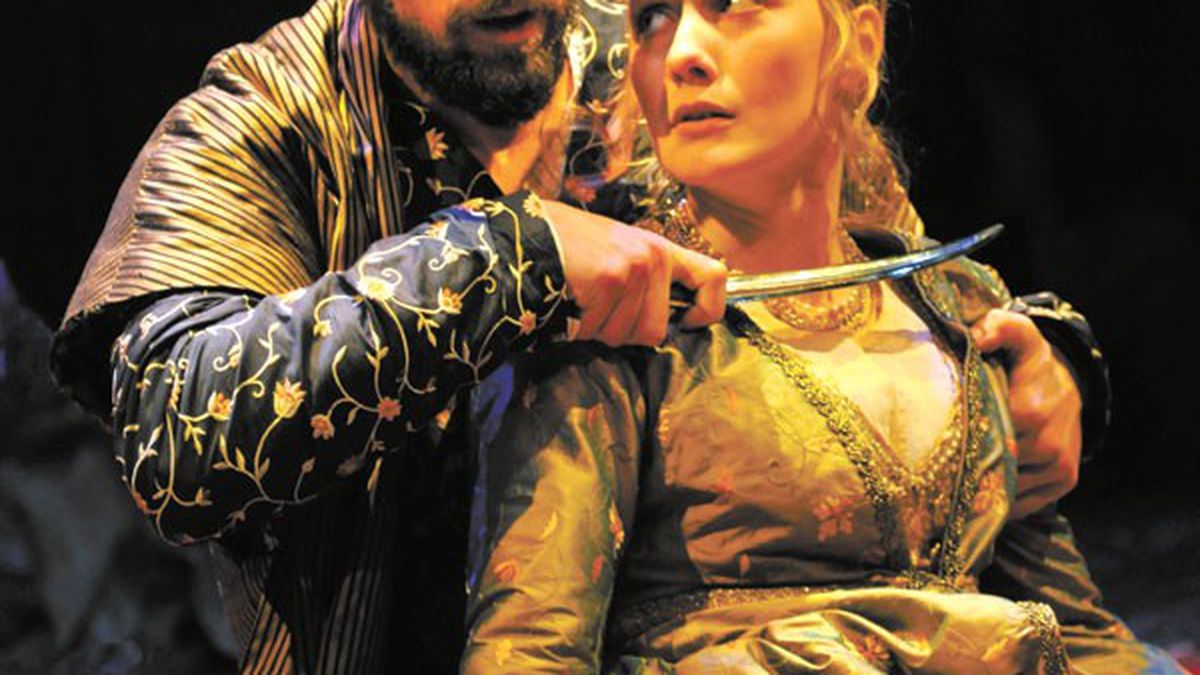The Arabian Nights is just the latest of several lush
and idiosyncratic takes on legends and fables that writer-director Mary
Zimmerman has brought out from Chicago to Berkeley Repertory Theatre.
Since 1996’s Journey to the West, Zimmerman has been a frequent
visitor to Berkeley Rep, dazzling with her 1999 staging of Ovid’s
Metamorphoses in a pool of water, then The Notebooks of
Leonardo da Vinci, the fairy-tale Secret in the Wings, and a
return to the Greeks last year with the sublime Argonautika.
Zimmerman’s first show on the Rep’s smaller Thrust Stage, The
Arabian Nights is far from a new work, first produced at Chicago’s
Lookingglass Theatre Company in 1992, but it feels looser than her
other productions here. At the same time it drives home the sense that
even the least polished of her pieces is still a gem.
This one’s based on One Thousand and One Nights, the
collection of Arabic folk tales assembled around the 9th century and
continually reworked and added to ever since. The earliest written
manuscript hails from the 14th century, but there are many versions,
many of them mammoth. The familiar stories of Aladdin, Ali Baba, and
Sinbad were probably Arabic folk tales inserted into the collection by
European translators.
Zimmerman doesn’t go for such flashy adventure yarns in her
adaptation, favoring instead moral fables, bawdy comic tales,
cautionary love stories, and fart jokes. The stories are largely comic
in the first act and lyrical in the second. In the play, as in the
original, stories are nestled within stories. The characters in one
story tell other stories in order to escape punishment or gain
treasures.
In the framing story, there’s a very good reason for the narrative
strata. King Shahryar finds his wife cheating on him, kills her, and
thereafter has a virgin bride brought to him every night and executed
in the morning so that he can never be betrayed again. Once all the
virgins in town have either fled or been killed, his vizier’s daughter
Scheherazade offers herself to the king. On their first night together
she tells him a story that isn’t finished when morning comes, and he
spares her life for a day so he can hear the rest. This goes on for a
thousand and one nights as she spins one yarn after another, always
stopping just when it’s getting good, until the king is utterly rapt
with her.
The fifteen actors play many parts and also provide the lush Middle
Eastern themed music by Andre Pluess & the Lookingglass Ensemble.
Ryan Artzberger has an animalistic intensity as Shahryar, a portrayal
that deepens beautifully over the evening. Throaty Sofia Jean Gomez as
Scheherazade is less captivating as a storyteller than in the way she
mirrors the characters in her stories. Allen Gilmore is particularly
entertaining as the increasingly stooped vizier who returns every
morning with his daughter’s shroud, as a generous sheikh and a
cuckolded jester, as is Melina Kalomas as a bewitching beauty who gives
a prideful youth his comeuppance.
The cast sits observing and narrating from the sidelines, often
including Shahryar watching the great caliph Harun al-Rashid (Barzin
Akhavan) watch a story within a story. Unimportant details are glossed
over amusingly with phrases like “on such-and-such a street.”
The countless tales untold here are suggested by a sequence in which
the ensemble acts out a half-dozen stories simultaneously. The
choreography of this bit is impressive as supporting characters in one
fable deftly turn and become characters in another story already in
progress. The spoken parts of the machine are less well-oiled, as it’s
nearly impossible to pick out even short snippets of any one story in
the cumulative white noise.
It’s one of several devices that, while often effective and
appropriate to the storytelling theme, also interrupt the flow and call
attention to themselves as gimmicks. The most enjoyable of these is an
improvised section where two actors chosen at random each night
improvise ludicrous lists of what’s in a bag that they both claim as
theirs. The most perplexing is an interpretive dance in which the
ensemble mimes minutiae of daily life from cradling babies to cleaning
out their ears.
Zimmerman’s The Arabian Nights was conceived out of
the first Gulf War and has only become more topical during the current
war and occupation in Iraq. The program notes mention that the ancient
bridge in Baghdad under which Harun al-Rashid hides in one of the
stories was destroyed in 2003. Zimmerman lets any connection with
current events resonate nearly without comment, except the way the
staging is framed. It opens with a bleak warehouse interior transformed
by the actors in a whirl of activity with colorful Persian carpets,
pillows, and lamps in Daniel Ostling’s enchanting set design
(beautifully complemented by Mara Blumenfeld’s magnificent robes,
kaftans, and turbans). A haunting final image suggests that the culture
celebrated in the last three hours or so could be blown away by the
wind, whether over centuries or in an instant.












